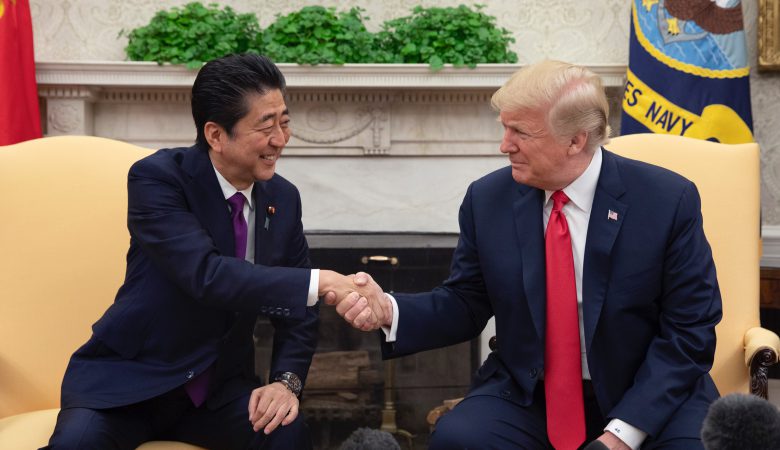Japan and U.S. Trade Negotiations could Begin new Era of Innovation
The world’s largest and third largest economies have today started trade negotiations that promises to shrink the trade deficit, boost each other’s GDP, and significantly improve intellectual property rights for American and Japanese companies.
While Congress begins the process of ratifying the USMCA and the president continues making progress on U.S.-China trade negotiations, the next trade legacy the American president is prepared to take on is with Japan. Japan is the third highest foreign investor in the United States at $477 billion annually, or 12% of total foreign direct investment in the United States.
Though early reports insist the Japanese delegation will focus only on the trade in goods. The U.S. believes Japan, as a modern high-tech economy, is also ready to adopt the same type of 21st century benchmark rules for intellectual property and digital trade that the Trump administration pioneered in the USMCA. Unfortunately, recent policy reforms in Japan work to redefine what products, or even companies, are deemed innovative and can enjoy satisfactory IP protections. This would harm especially American innovative leaders. ATR and PRA addressed a letter to USTR Deputy Ambassador Gerrish to keep this setback in mind during the negotiations.
In December 2018, the United States Trade Representative (USTR) released its summary of negotiating objectives with Japan. On intellectual property rights it aims to promote adequate and effective protection of intellectual property rights, including through the following:
Seek provisions governing intellectual property rights that reflect a standard of protection similar to that found in U.S. law, including, but not limited to, protections related to trademarks, patents, copyright and related rights (including, as appropriate, exceptions and limitations), undisclosed test or other data, and trade secrets.
Provide strong protection and enforcement for new and emerging technologies and new methods of transmitting and distributing products embodying intellectual property, including in a manner that facilitates legitimate digital trade, including, but not limited to, technological protection measures.
Ensure standards of protection and enforcement that keep pace with technological developments, and in particular ensure that rights holders have the legal and technological means to control the use of their works through the Internet and other global communication media, and to prevent the unauthorized use of their works.
Prevent or eliminate government involvement in the violation of intellectual property rights, including cyber theft and piracy.
Secure fair, equitable, and nondiscriminatory market access opportunities for U.S. persons that rely upon intellectual property protection.
Respect the Declaration on the TRIPS Agreement and Public Health, adopted by the World Trade Organization at the Fourth Ministerial Conference at Doha, Qatar on November 14, 2001, and ensure that the Agreement fosters innovation and promotes access to medicines, reflecting a standard similar to that found in U.S. law.
On digital trade in goods and services as well as cross-border data flows it aims to:
Secure commitments not to impose customs duties on digital products (e.g., software,music, video, e-books).
Ensure non-discriminatory treatment of digital products transmitted electronically and guarantee that these products will not face government-sanctioned discrimination based on the nationality or territory in which the product is produced.
Establish state-of-the-art rules to ensure that Japan does not impose measures that restrict cross-border data flows and that Japan does not require the use or installation of local computing facilities.
Establish rules to prevent governments from mandating the disclosure of computer source code or algorithms.
Establish rules that limit non-IPR civil liability of online platforms for third-party content, subject to the Parties’ rights
to adopt non-discriminatory measures for legitimate public policy objectives or that are necessary to protect public morals.
This is fantastic news coming out of the USTR, and if these objectives are aggressively pursued in negotiations with Japan, both countries will benefit tremendously.
One landmark achievement in the USMCA that should be pursued with Japan is the protection of biological and agro-chemical test data protection to 10 years. On average, it cost $2.8 billion in investment and 12 years of research and development to bring new medicines to market, and only less than 10 percent make it through clinical trials. Japan should protect this vital form of IP in order to further incentivize research.
In addition, it is time for Japan, as a leading innovator to end price controls for pharmaceuticals and such provisions need to be addressed in the trade negotiations. Due to Japan’s cost reference methodology of setting drug prices, the country often has to wait years for new, lifesaving drugs to enter their markets. The U.S. negotiators should press Japan hard on drug price controls and insist that Japan adopt a more free-market friendly policy toward the pharmaceutical industry.
Edit: on April 16/2019 the article was updated to include that PRA and ATR sent a letter to USTR ambassador Gerrish shortly after the article was first published.

